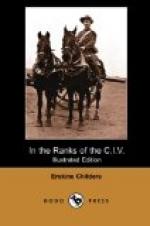of your convoys; it will be all right when we get it.”
De Wet himself was very pleasant to them, and took
good care they got their proper rations. They
rode always on waggons, and he spoke feelingly of
the horrible monotony of the jolt, jolt, jolt, from
morning to night. They nearly always had a British
force close on their heels, and no sooner had they
outspanned for a rest than it would be “Inspan—trek.”
“Up you get, Khakis; the British are coming!”
Then pom-pom-pom, whew-w-w-w, as shells came singing
over the rear-guard. At these interesting moments
they used to put the prisoners in the extreme rear,
so that the British if they saw them, could not fire.
He accounted for the superior speed of the Boers by
their skill in managing their convoy; every Boer is
a born driver (in fact, most of their black drivers
had deserted), and they take waggons over ground we
should shudder at, leaving the roads if need be, and
surmounting impossible ascents. Again they confine
their transport to the limits of strict necessity,
and are not cumbered with all the waggon-loads of
officers’ kit which our generals choose to allow.
Their rapidity in inspanning is marvellous; all the
cattle may be scattered about grazing, but in five
minutes from the word “Trek!” they are
inspanned and ready. Their horses, he said, were
wretched, and many rode donkeys; how they managed
to get about so well he never could understand, but
supposed the secret of their success was this body
of well-mounted, reliable scouts, who saved all unnecessary
travelling to the main body. A very large proportion
of the Boer force were foreigners—French,
Germans, Dutch, Russians, Norwegians.
The soul of this tent is Jock, an Argyll and Sutherland
Highlander. He was wounded at Modder River, and
is now nominally suffering from the old wound, but
there is nothing really the matter with him; and as
soon as the Sister’s back is turned, he turns
catherine wheels up the ward on his hands. His
great topic is the glory and valour of the Highland
Brigade, discoursing on which he becomes in his enthusiasm
unintelligibly Scotch. It is the great amusement
of the rest of us to get rises out of him on the subject,
and furious arguments rage on the merits of various
regiments. He is as simple as a child, and really
seems to believe that the Highland Brigade has won
the war single-handed. He is no hand at argument,
and gets crushing controversial defeats from the others,
especially some Berks men, but he always takes refuge
at last “in the thun rred line,” as his
last entrenchment. “Had ye ever a thun
rred line?” he asks, and they quail. The
matter came to a crisis yesterday, when one of them
produced a handbook on British regiments and their
histories. The number of “honours”
owned by each regiment had been a hotly contested point,
and they now sat down and counted them. The Royal
Berks had so many—Minden, Waterloo, Salamanca,
Vittoria, Sevastopol, etc. In breathless
silence those accredited to the Argyll and Sutherland




